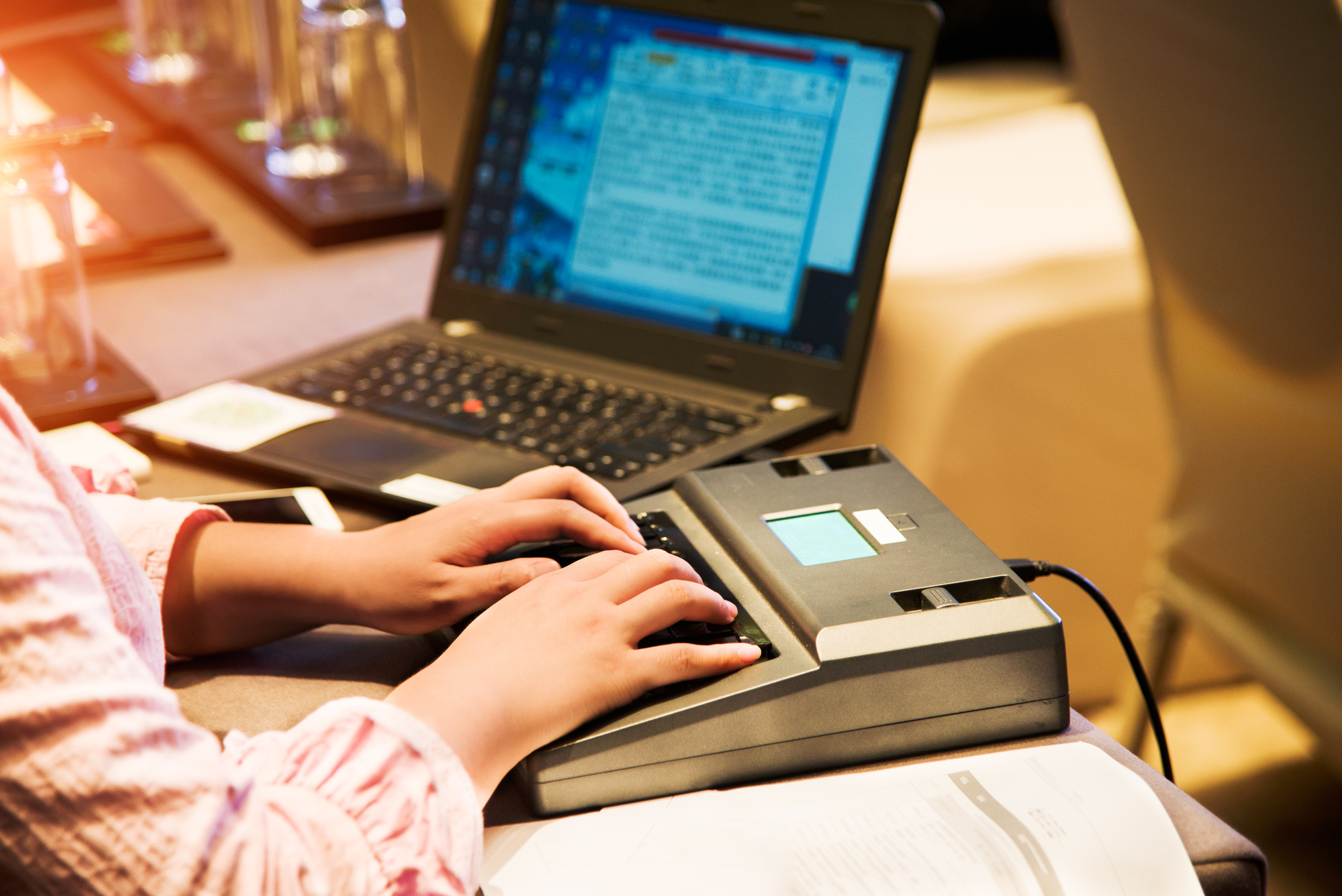The Behind-the-Scenes Work of court reporting in Legal Fairness
The Behind-the-Scenes Work of court reporting in Legal Fairness
Blog Article
Understanding the Important Function of Court Reporting in Legal Procedures
Court reporting is often overlooked, yet it's necessary in legal process. Allow's explore the basic features of court coverage and its significance in the lawful landscape.
The History of Court Coverage
Court reporting has an abundant history that goes back to old worlds, where scribes used different approaches to capture spoken words. The earliest kinds of shorthand emerged in Greece around 400 BC, allowing thinkers and political leaders to tape-record speeches swiftly. As you relocate through history, you'll locate that the Romans adopted similar techniques, improving them to document lawful proceedings. By the 16th century, modern-day shorthand systems started to form, enabling court press reporters to produce exact transcripts efficiently.
Today, court press reporters play a considerable function in legal process, making certain that every word talked in the court room is precisely documented. Recognizing this history highlights the significance of court reporting in preserving a fair lawful system.
The Skills Needed for Court Reporters
As a court reporter, you need strong inputting skills to keep up with the hectic discussion of legal procedures. Your capacity to pay attention diligently is equally as necessary, making certain every word is captured precisely. Understanding these skills is crucial to delivering specific and dependable transcripts.
Skillful Inputting Capacities

Solid Paying Attention Skills
Solid listening abilities are crucial for court reporters, as they have to properly catch talked words in actual time. This ability helps you differentiate between speakers, understand legal jargon, and follow complicated discussions. Inevitably, strong listening abilities make you an indispensable possession in lawful proceedings, making certain clearness and precision in the court document.
The Technology Behind Court Reporting
In the domain name of legal proceedings, modern technology plays a necessary duty in improving the precision and efficiency of court reporting. You're most likely knowledgeable about the conventional stenotype machine, yet contemporary stenotype reporter currently utilize innovative software that incorporates with these machines, enabling real-time transcription. This means you can have immediate access to the records as the proceedings unfold.
Digital audio recording is another technological improvement that's acquiring grip. It captures every spoken word, ensuring absolutely nothing is missed. Some press reporters use voice recognition software, which can assist simplify the transcription process, though it still needs human oversight for precision.
Furthermore, cloud-based storage space enables simple gain access to and sharing of records, boosting cooperation among lawful teams. By leveraging these innovations, court reporters can give premium, prompt records that are crucial for the legal procedure. Welcoming this technology not only improves your understanding however likewise assures reliability in lawful paperwork.
The Court Coverage Refine

As legal proceedings unravel, the court reporting process comes to be important in catching every information precisely. You'll find that a court reporter plays a vital duty by recording talked words right into composed message in real-time. When you step into the court room, the press reporter is already prepared, geared up with specialized devices like stenographic makers sites and audio recording gadgets.
Throughout the proceedings, the reporter listens diligently, keying out whatever claimed, from witness testaments to legal representatives' disagreements. You might notice them pausing occasionally to assure clarity or to ask for a repeat if something wasn't clear. After the session, the press reporter examines the transcript, making necessary edits for readability.
This whole procedure not only assures a comprehensive document yet also prepares you for future recommendation throughout appeals or case evaluations. In the hectic setting of a court, the court reporting process is necessary for keeping an accurate account of events.
The Significance of Precision in Transcripts
While a stenotype reporter's main task is to transcribe spoken words, the accuracy of these records is crucial for the honesty of legal process. When you're associated with a situation, you rely on specific paperwork to understand the events and arguments presented. Any errors in transcription can result in misconceptions, misinterpretations, and even wrongful judgments.
Precise transcripts guarantee that every detail is recorded, supplying a reputable document for courts, attorneys, and juries. This level of information is crucial throughout charms or when referencing previous statements. If a transcript includes mistakes, it can undermine the whole lawful procedure, possibly influencing outcomes.
Moreover, accurate records promote the legal rights of all celebrations entailed, advertising fairness and transparency. So, whether you're an attorney planning for trial or a witness reviewing your testimony, you can trust that the stenotype reporter's skill in accuracy plays a substantial duty in your situation's success.
The Function of Court Reporters in Different Legal Setups
Stenotype reporter play a crucial role in numerous lawful settings, from tests to depositions and legal hearings. You'll locate that their job assurances every talked word is precisely recorded, which is vital for the legal process. Recognizing exactly how their responsibilities vary across these atmospheres can highlight their effect on the justice system.
Court Reporters in Trials
In any lawful test, you'll find that court reporters play an essential duty in capturing the procedures with accuracy and precision. Court press reporters have to keep focus and rate, commonly making use of specific equipment to maintain up with busy discussion. Ultimately, court reporters aid copyright the justice system, ensuring openness and liability throughout trials.
Depositions and Lawful Hearings
Beyond trials, stenotype reporter also play a necessary role in depositions and legal hearings. During these procedures, they record every spoken word, ensuring a precise document of testimonies and conversations. You'll discover that this precision is essential, as depositions commonly offer as a foundation for later disagreements in court. Stenotype reporter provide real-time transcription solutions, permitting attorneys to comply with along and resolve any type of problems quickly. Their job boosts the efficiency of lawful hearings, making it less complicated for all events to refer back to the official record. In addition, the records they create can be significant for allures and various other lawful processes - court reporting. Basically, court press reporters are essential in preserving the stability and clearness of the lawful record in depositions and hearings.
Future Trends in Court Reporting
As innovation remains to advance, the future of court coverage promises to be shaped by ingenious devices and techniques that improve precision and performance. You'll likely see raised usage of expert system and real-time transcription solutions, streamlining the reporting process. These innovations can help you gain access to transcripts quicker, which can be important for your legal strategies.
In addition, integrating video clip conferencing and remote coverage will end up being more usual, permitting you to attach with stenotype reporter from anywhere (court reporting). This adaptability can make depositions and hearings more obtainable, conserving both time and sources
You'll likewise observe a focus on digital recordkeeping, which streamlines the storage and retrieval of transcripts. With cloud-based services, you'll have the capability to share documents securely and collaborate with your lawful team in real-time.
Regularly Asked Concerns
What Is the Ordinary Income of a Stenotype Reporter?
The typical wage of a stenotype reporter varies by location and experience, however you can expect it to vary from around $50,000 to $80,000 every year. Numerous elements influence this revenue, consisting of specialization and need.
Exactly how Do I End Up Being a Certified Stenotype Reporter?
To end up being a qualified court press reporter, you'll need to finish a court reporting program, pass a qualification exam, and gain practical experience. It's crucial to remain upgraded on industry criteria and proceeding education needs.
What Types of Situations Do Court Reporters Cover?
Court reporters cover various situations, including criminal trials, civil suits, depositions, and settlement hearings. You'll find them documenting everything, making certain accurate records for judges, lawyers, and parties involved, capturing every word talked in lawful setups.
Are Court Reporters Required to Have a Degree?
Yes, stenotype reporter generally require a level or qualification in court reporting. Lots of programs offer specialized training, ensuring you gain the skills required for accurate transcription and legal paperwork in numerous settings.
Can Court Reporters Work From Another Location?

Report this page